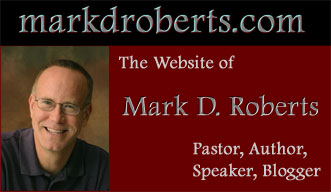| |
A Resource by Mark D. Roberts |
|
Hoodwinked by Harry Potter
by Rev. Dr. Mark D. Roberts
Copyright © 2005 by Mark D. Roberts
Note: You may download this resource at no cost, for personal use or for use in a Christian ministry, as long as you are not publishing it for sale. All I ask is that you give credit where credit is due. For all other uses, please contact me at mark@markdroberts.com. Thank you.
One Sunday after church, I stumbled upon a fascinating discussion on television. An influential pastor, backed up by two “experts,” was blasting away at Harry Potter, whom he explicitly associated with Satan and Adolf Hitler. Not exactly good company for the young wizard! Millions of children, the pastor claimed, had written letters seeking admission to Hogwarts, the fictional school of wizardry attended by Harry. The pastor accused author J.K. Rowling of intentionally but surreptitiously drawing children into witchcraft. People who underestimate the threat posed by Rowling’s writing have been hoodwinked by Harry! Not surprisingly, the TV pastor urged Christians of all ages to avoid all Harry Potter books and movies.
Conversely, many highly respected Christian leaders have praised the Harry Potter books. They have concluded that children might read them without danger, and even with benefit. They have also suggested that adult believers might actually enjoy these books as well.
What's a thoughtful Christian to do? Is Harry Potter a insidious Satanic plot or an edifying children's fantasy? Should Christians read the books? Go to the movies? And how should we who have younger children guide them? Should we allow them to be exposed to Harry Potter? Should we encourage them to read the books? (When I speak of children in this article, I’m thinking mainly of those in elementary school and middle school.)
Before I suggest answers to these questions, I'd like to sketch out a few foundational observations upon which I’ll build my practical advice.
First, godly Christians will disagree about the appropriate response to Harry Potter, and that's okay. The first part of this sentence is indisputable. Godly, mature Christians have already come down on both sides of the Harry Potter debate. Some people on either side have suggested that their opponents have abandoned biblical truth, but I don't agree. Harry Potter is like many things throughout Christian history concerning which Christians may hold differing opinions. In the first century, the issue was eating meat. More recently, believers have differed over dancing, drinking, playing cards, and going to movies. I am convinced that Christians will always disagree about Harry Potter, partly because this disagreement reflects broad cultural and theological differences. But more significantly, the dispute will not be settled because nothing in the Bible either prohibits or allows exposure to fictional accounts of witchcraft and wizardry.
Second, the Bible unequivocally condemns real witchcraft and wizardry. God's people should not “turn to mediums or wizards” (Lev. 19:31). Moreover, “no one shall be found among you who . . . practices divination, or is a soothsayer, or an augur, or a sorcerer, or who casts spells, or who consults ghosts or spirits, or who seeks oracles from the dead. For whoever does these things is abhorrent to the Lord” (Deut. 18:10-12). God’s people should never engage in occult or magical practices such as fortune telling, Ouija boards, spell-casting, and séances. Moreover, we should avoid participation in Wicca (modern witchcraft).
Third, the Harry Potter books portray a fictitious world in which wizardry is neither good nor evil, but something that can be used either for good or for evil. Unlike in the real world, where witchcraft and wizardry are always wrong, in the make-believe world created by author J.K. Rowling, such activities are “value neutral.” Harry and his cohort can use magic to heal or to hurt, to mend or to maim. The morality of magic, in Harry’s world, depends on the use to which it is put.
Fourth, we must distinguish between the real world, in which wizardry is always evil, and the fictional world of Harry Potter, in which wizardry can be used for good. If we cannot make this distinction, then we might be inclined to consider real witchcraft as potentially good. This would contradict Scripture. Anyone who cannot regard Harry’s world as make-believe should not be exposed to it.
This last point leads directly to what is perhaps the most controversial of the practical questions: Should children be exposed to Harry Potter and his magical world, either through reading or through movies? . . .
The rest of this article can be found in the online version of Theology, News and Notes, the October 2003 Issue.
Home
|




